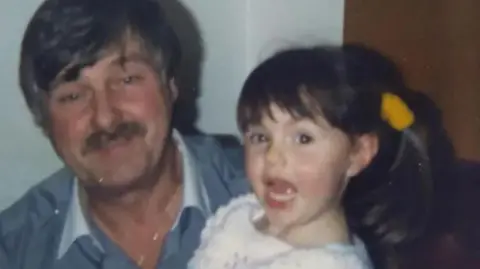
 Lime Pictures/Channel 4
Lime Pictures/Channel 4A soap actress, whose own father died of bowel cancer, has said she has been able to bring “real personal experience” to the role as she portrays her character’s diagnosis with the disease.
Jennifer Metcalfe, who plays Mercedes McQueen in the E4 show, Hollyoaks, said the story was “incredibly important” to her and she had “jumped at the chance to do anything that might encourage conversation”.
In recent months, Mercedes has undergone chemotherapy and had a stoma bag fitted.
Bowel Cancer UK said including the stoma on screen had helped take “some of the stigma and embarrassment away from it”.
Hollyoaks producers have worked closely with the charity to ensure the soap accurately showed what treatment could be like.
Hairpieces and wigs to cover Metcalfe’s own hair has helped give Mercedes the appearance of losing her hair, while make-up and prosthetics have also been used to create a chemotherapy port on the character’s chest and a post-surgery scar.
 Lime Pictures/Channel 4
Lime Pictures/Channel 4Metcalfe, 41, said: “This story is incredibly important to me. When I was aged 15 I lost my dad to bowel cancer and it has impacted my life hugely.
“I have never taken my own health for granted, so when we discussed the storyline I jumped at the chance to do anything that might encourage conversation.”
In one scene in the show, Mercedes is told the heartbreaking news that the treatment was not working and the hospital was not able to access the chemotherapy drugs she needed.
 Family photo
Family photoMercedes is seen with a stoma bag, which is used after bowel cancer surgery if a section of the bowel is removed.
Chief Executive Genevieve Edwards said: “Lot’s of people have spoken to us about how great it’s been to see [in the show] someone living with a stoma and it’s taken some of the stigma and embarrassment away from it.”
 Lime Pictures/Channel 4
Lime Pictures/Channel 4Ms Edwards said storylines like this could save lives.
“Seeing a character like Mercedes in a show like Hollyoaks could be enough to get you to go to your GP and have that conversation,” she said.
“The thing about bowel cancer is that when it’s diagnosed at its earlier stages it is treatable and curable and most people will survive that diagnosis – so it could be life-saving.”
Metcalfe said her goal was to give people more confidence to recognise symptoms and take action.
“I’d love people to go away, consider any changes to their bodies and know the right avenues to go to,” she said.



Be the first to comment